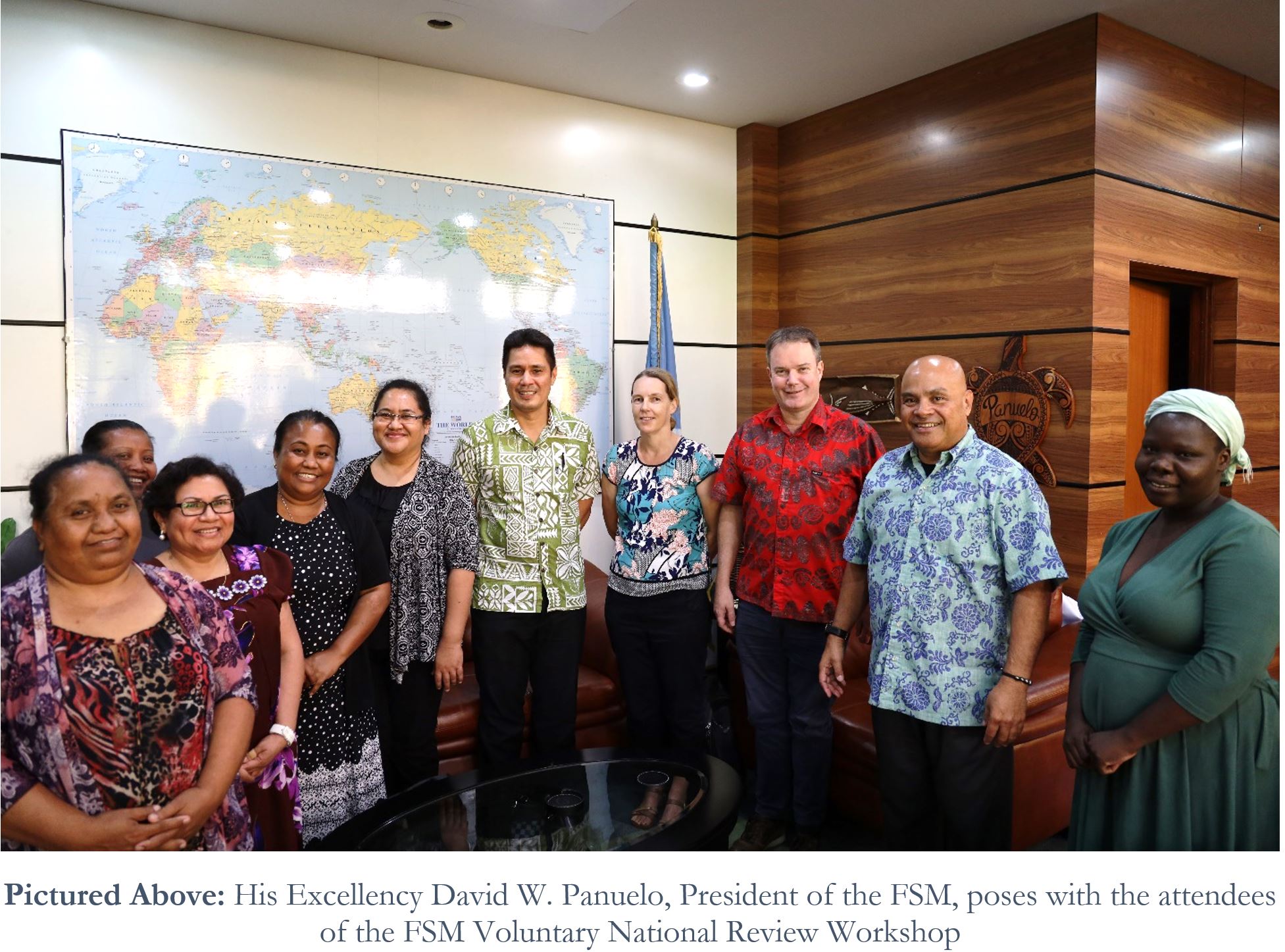
FSM Information Services
Press Release
FSM Voluntary National Review Workshop on Sustainable Development Goals a Success, Another Planned for Late February
PALIKIR, Pohnpei—On December 5th, 2019, His Excellency David W. Panuelo, President of the Federated States of Micronesia (FSM), received attendees of the FSM Voluntary National Review Workshop, a collaborative exploration on how the FSM is progressing on the Sustainable Development Goals (SDGs) in the context of its own national development, in a courtesy call. The purpose of the meeting was to update the President on the outcomes of the Voluntary National Review Workshop, held between December 2nd to December 5th, and to hear from the President his views on next steps.
The SDGs derive from the United Nations General Assembly as part of UN Resolution 70-1, which describes the 2030 Agenda—i.e., what the global community of nations around the world wish to see addressed by 2030.
The goals themselves are purposely broad and interdependent. They are:
- “No Poverty”—which, in the context of the FSM, could be construed to mean that no citizens of the Nation suffer from lacking needs such as quality shelter, familial love and community acceptance, and an abject lack of financial resources.
- “Zero Hunger”—which, in the context of the FSM, could be construed to mean that not only are citizens able to eat multiple times a day but that their meals are as nutritious as they are filling.
- “Good Health and Well Being”—which, in the context of the FSM, could be construed to mean that the epidemic of non-communicable diseases, such as diabetes, are resolved; that citizens are vaccinated against diseases like Measles; that hospitals are well staffed and resourced; that mental health is addressed with more consideration than it perhaps has in the past.
- “Quality Education”—which, in the context of the FSM, could be construed to mean that the FSM School Accreditation procedures are thoroughly implemented, and that all children—whether they’re a 5th grader in Kapingamarangi or an 11th grader at Yap Catholic High School—learn to read, write, and express themselves.
- “Gender Equality”—which, in the context of the FSM, could be construed to mean that men and women are offered the same opportunities with equivalent means of measuring success for those opportunities.
- “Clean Water & Sanitation”—which, in the context of the FSM, could be construed to mean that all citizens have access to clean water for the purposes of drinking, cooking, and bathing, either through supporting public utilities and/or through the investment of water catchments and purification devices.
- “Affordable & Clean Energy”—which, in the context of the FSM, could be construed to mean that the FSM Energy Master Plan is implemented, with the Nation increasingly relying on sustainable energy such as solar, promoting clean energy such as through transforming FSM Petroleum Corporation’s/Vital’s mandate to include an emphasis on sustainable energy, while expanding citizens’ access to electricity so that all citizens have power in their homes at all times.
- “Decent Work & Economic Growth”—which, in the context of the FSM, could be construed to mean the expansion of labor protections beyond the existence of the minimum wage, the promotion of public-private partnerships such as the Joint Venture between FSM Petroleum Corporation/Vital and SoftBank Energy, the expansion of economic opportunities such as the Japan International Cooperation Agency’s forthcoming development on Pohnpei State’s commercial and fisheries port, and the growth of wage-earning jobs in both historical sectors (e.g. via the DaYang Fisheries Plant in Kosrae State) and through the development of new sectors (e.g. via a Vaka Motu-construction facility in Yap State).
- “Industry, Innovation & Infrastructure”—which, in the context of the FSM, could be construed to mean that public infrastructure projects—such as the forthcoming Climate Resilient roads project through the World Bank, or the expansion of fiber optic cables to homes, schools, and hospitals—must allow citizens the means to access services and opportunities so as to spur and promote industrious and innovative behavior.
- “Reduced Inequalities”—which, in the context of the FSM, could be construed to mean increased development in both highly populated and arguably neglected regions like Faichuuk, as well economic and social policies that ensure that the quality of life for the Nation’s worst-off and best-off aren’t unrecognizable to each other.
- “Sustainable Cities & Communities”—which, in the context of the FSM, could be construed to mean that major population centers such as Kolonia (Pohnpei), Colonia (Yap), and Weno (Chuuk) have their development planned in such a way as to maximize citizens accessibility to services, and that rural communities—which the vast majority of citizens belong to—are afforded the same care and concern.
- “Responsible Consumption & Production”—which, in the context of the FSM, could be construed to mean that unsustainable but convenient products such as most forms of plastic and Styrofoam are banned, with the Nation promoting the use of sustainable equivalents (e.g. taro plates, organic straws) where possible; it could also mean the protection of the Nation’s fisheries as a means of ensuring continuous access to nutrition and national revenue.
- “Climate Action”—which, in the context of the FSM, could be construed to mean implementing innovative initiatives in sustainable sea transport, such as implementing the use of Okeanos for the Sea Foundation’s Vaka Motu to develop a frequent means of remote island transport; it could also mean the implementation of the FSM Energy Master Plan and an increasing reliance on renewable energy as opposed to fossil fuels; this goal is a good example of how the SDGs are interdependent and complementary.
- “Life Below Water”—which, in the context of the FSM, could be construed to mean the Nation’s protection of its Exclusive Economic Zone, initiatives with the Waitt Foundation & Blue Prosperity Coalition to protect 30% of the FSM’s ocean by 2030, and expanding the Technology for Tuna Transparency (T3) Challenge in partnership with The Nature Conservancy et al. to other parts of the Pacific.
- “Life On Land”—which, in the context of the FSM, could be construed to mean appropriate data collection and analysis so as to maintain the Nation’s biodiversity, the promotion of charismatic flora and fauna such as the Ka forests in Kosrae and the Serehd in Pohnpei, implementation of the Ridge to Reef program, and the expansion of highly successful projects such as the Pilot Farm in Pohnpei.
- “Peace, Justice, & Strong Institutions”—which, in the context of the FSM, could be construed to mean enforcing the laws already in place, strengthening transparency and accountability efforts on behalf of National and State Governments and Non-Government Organizations, and, as President Panuelo has said in the past, propagating the usage of one’s conscience to determine one’s actions. “The best law is your conscience,” the President has said.
- “Partnership For the Goals”—which, in the context of the FSM, could be construed to mean seeking peace, friendship, cooperation, and love in our common humanity with all peoples, governments, organizations, and development partners throughout the FSM, throughout the Micronesian subregion, throughout the Pacific, and throughout the World as a whole.
Crucially, part of the purpose of the Voluntary National Review is that the FSM National Government is not the sole authority on answering the question “What does success look like?” when it comes to the 17 SDGs. Every member of civil society—a fancy and bureaucratic term meaning citizens like you—is involved in joining hand in hand as we make our islands another promised land.
“The big part of the Voluntary National Review,” said Mr. Patrick Tuimalealiifano to President Panuelo, “is about the people. It’s all about—how do we engage the people to tell their stories?”
“It’s about having…stakeholder engagement plans…giving a voice to the marginalized…and coming up with integrated solutions towards addressing key important development challenges,” Mr. Tuimalealiifano continued.
The FSM—along with the Independent State of Samoa, Papua New Guinea, and Solomon Islands—will be giving a presentation on its Voluntary National Review Report on the Nation’s progress towards the 17 SDGs in the summer of 2020. President Panuelo suggested that he looks forward to the FSM’s report to the United Nations, and instructed the Working Group on the SDGs that before that happens—and before the report is finished—that he wants more involvement from citizens across the Nation.
“Sharing stories is so powerful,” President Panuelo said. “That’s the Pacific way...I appreciate this meeting because I think we all need to be thinking about what we want our country to be, and what we want our World to be.”
The FSM National Government is intending to host another workshop on the Voluntary National Review in February 2020, and humbly requests representatives of all State Governments, Non-Government Organizations, and interested members of the private sector and civil society to attend.

